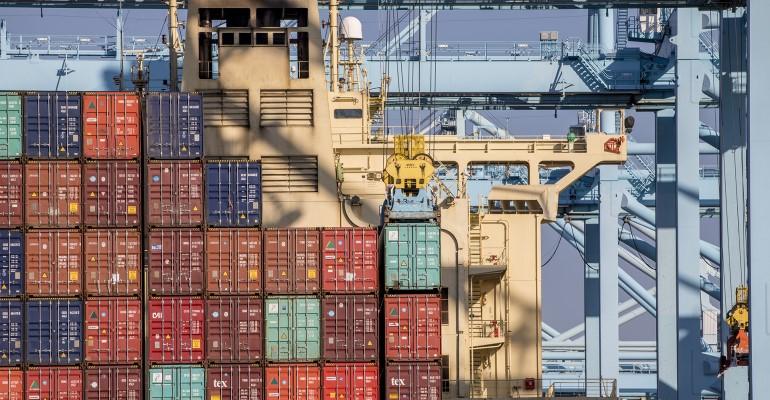As container shipping spot rates drop to close to 2019 levels on some major trades it does not bode well for carriers renegotiating long-term contracts in the coming months.
Marcus Hand | Dec 06, 2022
In particular spot rates the on the Asia – Europe trade have collapsed over recent weeks with the Shanghai – Rotterdam rate, reported by Drewry as part of its World Container Index (WCI), losing 47% over just the last four weeks. As of last Thursday the Shanghai – Rotterdam spot rate stood at $1,965 per feu, and overall the WCI was down 75% at $2,284.10 per feu compared to the same week a year earlier
The sharp fall in spot rates on the Asia – Europe trade will be particularly concerning to lines as it comes just as at the time for negotiating annual contracts on the trade. It does not take too much imagination understand the ammunition a sub-$2,000 spot rate will give shippers at the negotiating table.
Related: Warning of container shipping rate war ahead
We are already starting to see the impact and Xeneta reported a 5.7% drop in contract rates during November.
The large number of blank sailings by lines in an effort to prop up the spot market illustrates that they are taking the impact seriously, but as it stands observers do not see it as enough to stem the tide
Related: Asia – Europe container spot rate plunge continues
Lars Jensen, CEO of Vespucci Maritime, writing in the Baltic Exchange’s monthly FBX report said a hard landing was in progress. “Over the past month, the market downturn has gathered further steam, and we are now entering the phase where the market in places is now beginning to go below pre-pandemic levels as the correction downwards from the historical high turns into a price war driving rates down.”
Jensen noted numbers from Container Trade Statistic (CTS) in September that globally lifted teu were down 8.6% and teu/miles demand was down 13.2%. Compared to pre-pandemic in 2019 overall teu demand declined -2.6%, and demand measured in teu/miles was now -7.6% lower than the level in 2019.
“From a shipper perspective, this also means that negotiations for annual contract rates will become very favourable in the next few months, with potentially outstanding deals to be had in February/March 2023,” he said.
How long the collapse in demand will continue depends on whether the world is entering a mild or prolonged recession. In the case of a mild recession demand and spot rates could rebound from mid-2023 onwards.
Meanwhile HSBC’s Global Freight Monitor noted that the Shanghai Containerized Freight Index (SCFI) was in 4Q-to-date, on average down 54% quarter-on-quarter or 68% year-on-year. While this was still 82% above the Q4 2019 average a continued decline at 7.2% per week would see the SCFI hit 2019 levels in just for four weeks.
In terms of what this means for contract negotiations between shippers and lines, HSBC said: “With some players already lowering their contract rates in the current cycle, we argue that contract rates in the upcoming renewals could be reset closer to the pre-pandemic levels despite costs having risen 20-30% or even below breakeven levels for some liners. A fall to such loss-making levels could potentially drive a meaningful withdrawal of capacity.”
Despite all this bad news lines continued mega-profits reported by lines in Q3 – estimated at a whopping $58.9bn by John McCown’s Blue Alpha Capital and as he noted “no collapse was imminent”, which is true for the top tier lines in terms of earningsin the coming quarter. However, the situation is already more serious for smaller players that jumped into the market in 2021/22 looking make a quick buck off sky high rates on long-haul trades that had in recent years become the exclusive preserve of large alliance member lines.
Back in November 2021 Port of Los Angeles Executive Director Gene Seroka noted the port had 10 customers he described as “newcomers”. These newcomers operated smaller tonnage, often chartered-in at very high rates, booking spot cargoes from Asia often without having even having a reserved a berthing slot for when their ships arrived in the US at ports such as LA.
Some of these new players are now in trouble. Just last week we reported on China’s CULines terminating its cooperation with Antong Holding to jointly operate international container shipping services, which it said it was doing to reduce the losses of both sides.
“We have gained good economic benefits at early stage of our cooperation, however, due to the changes of international situation and sharp drop of international shipping market, the co-operated European and American services cannot maintain normal operation,” CULines said
Copyright © 2022. All rights reserved. Seatrade, a trading name of Informa Markets (UK) Limited.
Reference: https://www.seatrade-maritime.com/containers/container-lines-facing-difficult-contract-negotiations

